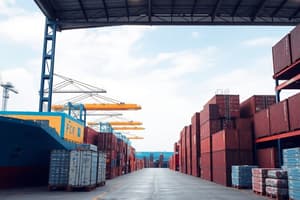Podcast
Questions and Answers
What is the primary purpose of conducting an inspection before establishing a warehouse?
What is the primary purpose of conducting an inspection before establishing a warehouse?
To determine the necessary requirements and obtain approval from the Competent regulatory authority
What is the key difference between a public warehouse and a private warehouse?
What is the key difference between a public warehouse and a private warehouse?
A public warehouse is established and managed by the customs administration, while a private warehouse is established and managed by private institutions or companies
Why do countries often prefer private warehouses over public warehouses?
Why do countries often prefer private warehouses over public warehouses?
Because specialized companies are better equipped to provide efficient services and are more cost-effective
What is the primary purpose of providing guarantees in warehouse establishment?
What is the primary purpose of providing guarantees in warehouse establishment?
What is the significance of obtaining approval from the Competent regulatory authority in warehouse establishment?
What is the significance of obtaining approval from the Competent regulatory authority in warehouse establishment?
How are customs warehouses classified in Egypt?
How are customs warehouses classified in Egypt?
What is the primary advantage of private warehouses over customs warehouses in Egypt?
What is the primary advantage of private warehouses over customs warehouses in Egypt?
What is the significance of establishing warehouses outside ports?
What is the significance of establishing warehouses outside ports?
What is the restriction for releasing goods using one customs declaration in a warehouse?
What is the restriction for releasing goods using one customs declaration in a warehouse?
What are the requirements for warehousing applications in customs procedures?
What are the requirements for warehousing applications in customs procedures?
What records must a warehouse licensee maintain and provide to the Customs Authority?
What records must a warehouse licensee maintain and provide to the Customs Authority?
What types of operations can be performed in a public warehouse, subject to authorization?
What types of operations can be performed in a public warehouse, subject to authorization?
What is a key consideration when performing operations in a public warehouse?
What is a key consideration when performing operations in a public warehouse?
What is the requirement for local materials used in operations in a public warehouse?
What is the requirement for local materials used in operations in a public warehouse?
What is the requirement for foreign machines used in operations in a public warehouse?
What is the requirement for foreign machines used in operations in a public warehouse?
What is the purpose of placing special marks on casings in a public warehouse?
What is the purpose of placing special marks on casings in a public warehouse?
What is the primary advantage for warehouse owners of operating a public warehouse?
What is the primary advantage for warehouse owners of operating a public warehouse?
How can an importer avoid paying customs duties and taxes on stored goods?
How can an importer avoid paying customs duties and taxes on stored goods?
What is a disadvantage of using a warehouse customs system for importers?
What is a disadvantage of using a warehouse customs system for importers?
What is a benefit of using a warehouse customs system for importers in terms of transportation costs?
What is a benefit of using a warehouse customs system for importers in terms of transportation costs?
What is a key difference between a public warehouse and a private warehouse?
What is a key difference between a public warehouse and a private warehouse?
Why might an importer choose to store goods in a warehouse in their own country rather than in the country of production?
Why might an importer choose to store goods in a warehouse in their own country rather than in the country of production?
What is a limitation of using a warehouse customs system in terms of accessing stored goods?
What is a limitation of using a warehouse customs system in terms of accessing stored goods?
What is a potential challenge for importers using a warehouse customs system in terms of regulatory compliance?
What is a potential challenge for importers using a warehouse customs system in terms of regulatory compliance?
Flashcards are hidden until you start studying
Study Notes
Warehouse Types and Requirements
- Public warehouse: established and managed by the customs administration, stores goods for third parties.
- Private warehouse: established and managed by private institutions or companies, under customs administration supervision.
Public Warehouse Advantages
- Obtaining a fee for storing goods and other services required for storage.
- Provides porters, guards, etc.
Private Warehouse Advantages
- Owner manages and takes care of goods during the storage period.
- Can cancel fees and taxes if goods are re-exported directly from the warehouse.
Importer Advantages
- Goods can remain in the warehouse without paying taxes until needed.
- Can charter ships at less demanding times, resulting in lower costs.
- Can cancel fees and taxes if goods are re-exported directly from the warehouse.
Disadvantages of Warehouse Customs System
- High costs, including storage and customs clearance fees.
- Complex regulations require specialized knowledge and expertise.
- Longer storage time due to customs clearance procedures.
- Limited access to goods stored in the warehouse.
Warehouse Operations and Regulations
- Goods must be inspected and transported according to customs procedures.
- Warehouse licensee must keep registers and documents regarding goods in custody.
- Operations in a public warehouse, such as mixing foreign products, removing casings, and moving goods, require authorization from the competent Control Authorities.
- Local materials used for operations are subject to export procedures, while foreign machines are subject to incoming goods procedures.
Studying That Suits You
Use AI to generate personalized quizzes and flashcards to suit your learning preferences.




